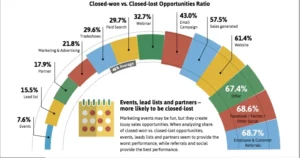What is a Sales Channel?
A sales channel refers to the different methods and paths that a company uses to sell its products or services to the end customer. It is a crucial aspect of the sales process that determines how a company reaches and interacts with its target market.

Definition of a Sales Channel
A sales channel can be defined as a route through which a company sells its products or services to customers. It can involve various intermediaries such as wholesalers, retailers, and online marketplaces, or even direct sales to end-users.
Importance of Sales Channels
Sales channels are important as they provide businesses with different avenues to reach their target audience, thus increasing the potential market for their products or services. They also offer opportunities for businesses to diversify and expand their customer base.
Types of Sales Channels
There are various types of sales channels including direct sales, indirect sales, online sales, and B2B sales. Each type has its unique characteristics and is suited for different business models and target markets.
Choosing the Right Sales Channel
Choosing the right sales channel is crucial for the success of any business. It involves a careful evaluation of various factors to determine the most effective approach for selling products or services.
Factors to Consider when Choosing a Sales Channel
Key factors to consider when choosing a sales channel include the nature of the product or service, target market, competition, distribution capabilities, and cost-effectiveness of the channel.
Different Types of Sales Channels
Businesses can choose from different types of sales channels such as direct sales, online marketplace, and distribution channels to reach their customers and sell their products or services effectively.
Implementing a Multichannel Sales Strategy
Implementing a multichannel sales strategy involves using multiple sales channels to reach customers. This approach can be effective in expanding the reach of a business and increasing sales opportunities.
Effectiveness of B2B Sales Channels
B2B sales channels are specifically designed for businesses selling to other businesses. These channels have unique strategies and considerations that are critical for the success of B2B sales efforts.
B2B Sales Channel Strategies
Effective B2B sales channel strategies involve building strong relationships with channel partners, understanding the complex buying process in B2B transactions, and offering customized solutions to meet the specific needs of business clients.
Importance of B2B Sales Channels
B2B sales channels are important for businesses as they provide access to a wide network of potential buyers and allow for bulk sales, which can significantly impact the overall revenue of the business.
Sales Performance in B2B Channels
Measuring sales performance in B2B channels is essential to evaluate the effectiveness of sales strategies and identify areas for improvement. It involves tracking key metrics such as conversion rates, average deal size, and customer retention.

Managing Multiple Sales Channels
Managing multiple sales channels requires a well-coordinated approach to ensure consistent sales performance across different channels while maximizing the overall sales potential.
Sales Team and Multichannel Sales
Having a dedicated sales team that is capable of managing and selling through different channels is essential for successful multichannel sales. The team should be trained to understand the nuances of each channel and adapt their sales approach accordingly.
Types of Sales Channel Strategies
Businesses can employ various sales channel strategies such as channel specialization, geographic segmentation, and channel partner collaboration to effectively manage multiple sales channels and optimize overall sales performance.
Increasing Sales through Multiple Channels
By leveraging multiple sales channels, businesses can expand their market reach, tap into diverse customer segments, and capitalize on the unique opportunities presented by each channel to increase their overall sales volume.
Optimizing Marketing Channels for Sales
Marketing channels play a crucial role in driving sales and influencing consumer purchasing decisions. Optimizing these channels is essential for maximizing the impact of marketing efforts on sales performance.
Impact of Marketing Channels on Sales
Effective marketing channels can significantly influence sales by creating awareness, generating interest, and ultimately leading to purchase decisions. It is crucial for businesses to identify the most effective marketing channels for their target audience.
Direct Sales Channel vs. Online Marketplace
Choosing between a direct sales channel and an online marketplace depends on factors such as target market behavior, product type, and business objectives. Each channel offers unique advantages and challenges that need to be carefully evaluated.
Choosing the Right Sales Channel for Your Business Model
Businesses need to align their sales channel strategy with their business model to ensure compatibility and effectiveness. Choosing the right sales channel involves understanding the strengths and limitations of each channel in relation to the business model.
The 5 most important sales channels
1. Online store (direct to consumer)
An online store is the first sales channel many new entrepreneurs create—and for good reason.
When you design your own store, you get to decide how products are displayed. You also get a complete view of customer data and sell directly to consumers (DTC), meaning you keep all the profits.
That direct relationship can be beneficial for your brand. Research shows that DTC ecommerce is growing across locations and industries, with most customers preferring to buy from independent stores over multi-brand retailers.
On the downside, it can be difficult to generate traffic when your store is new and your brand is still growing. Here, it’s best to use your online store as a hub for other sales channels. With Shopify, you can set up multiple sales channels and direct those customers back to your store.
Pros:
- Low startup costs. Build a store for free with Shopify’s free trial
- Use your store as a sales channel hub
- Use customer data to improve sales lead generation
- No third-party branding or product rules
- Take all the profits from your sales
Cons:
- Generating traffic can be difficult without a large marketing budget
- It’s up to you to manage orders
💡 Scroll down this post to find out how to set up sales channels from your Shopify store.
2. Modern marketplaces
Modern marketplaces are content-driven platforms that enable commerce. This includes social media channels like Instagram, TikTok, Facebook, and Pinterest. Increasingly, it also covers streaming sites like Spotify.
One of the reasons modern marketplaces are so successful as sales channels is that buyers are already spending time there. Customers see products immediately, in a context they’re familiar with. Adding a Buy button to a social media post is often a natural next step.
On Instagram, for example, you can make posts and Stories shoppable. If a customer sees an item they like, all they need to do is tap the shopping bag symbol and they’ll be directed to a page where they can see more details, visit your store, and check out.
Spotify, the music streaming service, is another modern marketplace built for selling. Listeners can scroll a band’s profile to preorder albums or purchase vinyl records and merch.

Data from Black Friday 2021 showed the number of sales generated by social media integrations almost tripled compared to the previous year. The data suggests that customers increasingly prefer to make purchases on social media platforms.
Pros:
- Apps can help you track performance and optimize your posts
- You can collaborate with other brands and influencers to cross-sell and cross-promote
- Most social media platforms have useful templates for ads and post creation
Cons:
- Continuous content creation is required to stay visible
- It can be difficult to create content that caters to social media algorithms
💡You can sell on Facebook and Instagram from your Shopify store.

3. Traditional marketplaces
Amazon, Etsy, eBay, and Google Shopping are examples of traditional marketplaces. These channels feature a wide range of product offerings, and customers generally search by the product they’d like to buy rather than the brand they’d like to purchase it from.
While traditional marketplaces come with a preexisting customer base, these platforms require you to give up control of customer service and fulfillment, and force competition on margins.
Pros:
- Put your products in front of a large existing customer base
- Use established distributors and marketing channels
Cons:
- Pay commission on sales made within traditional marketplaces
- Strict terms and conditions for brand and product promotion
- Fierce competition, including from international sellers with lower prices
4. Mobile apps
By 2025, mobile commerce sales are expected to make up more than 10% of all retail sales in the US.
With consumers turning to apps to do their shopping, brands are responding by building out more capable apps. Brands offer filterable catalogs, gamified experiences, coupons, and special deals to people who download and shop through their apps.
Pros:
- Users spend longer on apps than on websites
- Use your app to deliver special offers
Cons:
- Apps can be expensive to build
- Apps require constant updating as technology advances

5. B2B Sales
Business-to-business sales are when one business sells products or services to another. In 2023, it’s expected that 17% of US B2B sales are generated digitally.
Pros:
- Companies have more spending power than consumers
- Once you develop a good relationship with a company or business, you’ll have a repeat customer
Cons:
- Companies can take a long time to make a purchase
- Possible higher costs to create products or services for businesses
Building a resilient business
By creating a headquarters for your business with an online store, you set yourself up for success in a few ways. You’ll be able to develop a unique brand and maintain ownership of your customers and your data.
Your sales channels help your brand reach customers in the places where they already spend their time and focus their attention. With Shopify, commerce on these platforms can be more seamless, which is good for your customers. Plus, they’re integrated with your online store, so you maintain access to order data, customer relationships, and your brand identity.
Customer needs, marketplaces, social media, and the greater commerce market are constantly changing. Building a centralized ecommerce shop will allow you to be a more resilient business.



